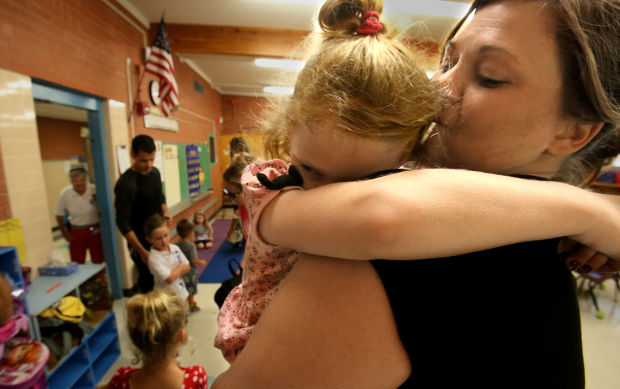Jennifer Anderson is no stranger to the first day of school.
She has 5 children, the oldest of whom is 16 years old. Even though she’s been through the back-to-school routine a few times, as she prepared to drop her youngest child off for kindergarten last fall, those first-day jitters were still there.
“With every child you hope they’ll do OK,” she said.
With five kids, Anderson has seen the gamut of first-day-of-school reactions: from having to peel one child off of her leg to another wanting to walk themselves to class alone.
Much has changed since Anderson's first-born stepped foot in a kindergarten classroom, but her expectation has been the same: that kindergarten be a place where her children learn to be students — how to follow class rules and getting adjusted to the structure of a typical school day.
“I don’t feel kindergarten has to be all academic,” she said. “I like my kids to be kids for a little while.”
While teachers still dedicate time to helping children learn how to behave in a classroom setting, Arizona’s College and Career Ready Standards call for the mastery of so much more.
“The expectations for students are much higher today than they were in the past,” said Pearl Chang Esau, President and CEO of Expect More Arizona, an organization that champions a world-class education for all children. “More is expected of our students, employers expect more and most jobs are going to require more education beyond high school.
"Now, for our kids entering kindergarten, we’re probably preparing them for jobs that don’t even exist today but the raising of expectations starts at kindergarten and they will begin to set a very important foundation for social and academic skills."
Academic expectations
By the end of the school year, it is expected that kindergartners will not only be able to name and identify the sound of all upper and lowercase letters, they will be reading, writing and solving math problems.
Brittany Betterton, a kindergarten teacher at Elvira Elementary School, recalls the first time she reviewed the standards and feeling as though the bar had been set too high.
“They seemed to be kind of crazy standards,” she said, but Betterton soon learned that her 5- and 6-year-old students would rise to the occasion.
“It's nothing to be scared of," Betterton assures parents. "We start at the basic level because kids come in knowing all different things and we build upon it all year, so we’re constantly coming back to things and reviewing before moving on to a new skill.”
Just as important as the work being done at school is reinforcing those skills at home. Activities, suggested by Expect More Arizona, include:
- Reading with your child for at least 20 minutes every day. Follow the words on the page with your finger and ask your child to explain their favorite parts of the story.
- Having your child use their finger to trace a letter while saying the letter’s name and sound. This can be done on paper, in sand or on a plate of sugar.
- Writing stories with your child. Have your child draw a picture and then tell you a sentence that goes with the picture.
- Having your child count items that can be found around the house. For example, how many light switches are in the house? How many shoes are in the closet? How many forks are in the drawer?
- Asking your child to count groups of objects around the house and identify which group has more, less or an equal number of objects. For example, are there more crayons or markers in the box? Do you have more books or stuffed animals? How many more?
Life skills
Kindergarten is also a time for students to gain independence.
Kids will be expected to manage their own bathroom needs, open up snack containers, feed themselves and put on their own jacket.
“It’s not really the academics that’s the most important when they come in to kindergarten," Betterton said. "It’s that they do have some self-help skills. It’s also important that they can communicate their needs and use language to solve problems.”
Knowing how to hold a pencil and how to use scissors are also skills parents can work on at home, she said.
Secrets to a successful school year
"Go to meet-the-teacher night," Anderson says. “It helps when they can meet the teacher and see the classroom and walk through the school beforehand.”
Once the school year is underway, it’s important to communicate with your child’s teacher with questions and concerns.
“Don’t be afraid to ask questions of the teacher,” Betterton says. “There are no dumb questions.”
Another tip: volunteer if you can, both Anderson and Betterton said.
“It helps you see what is going on in the classroom and you can support what’s being taught,” Anderson said.





